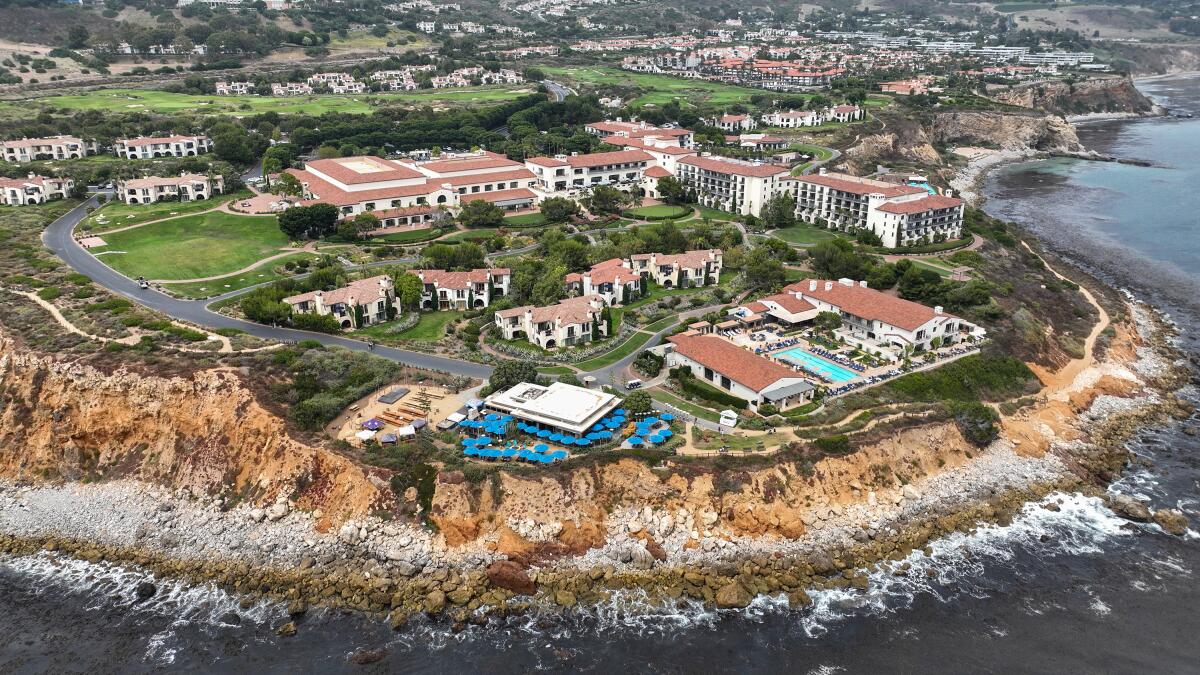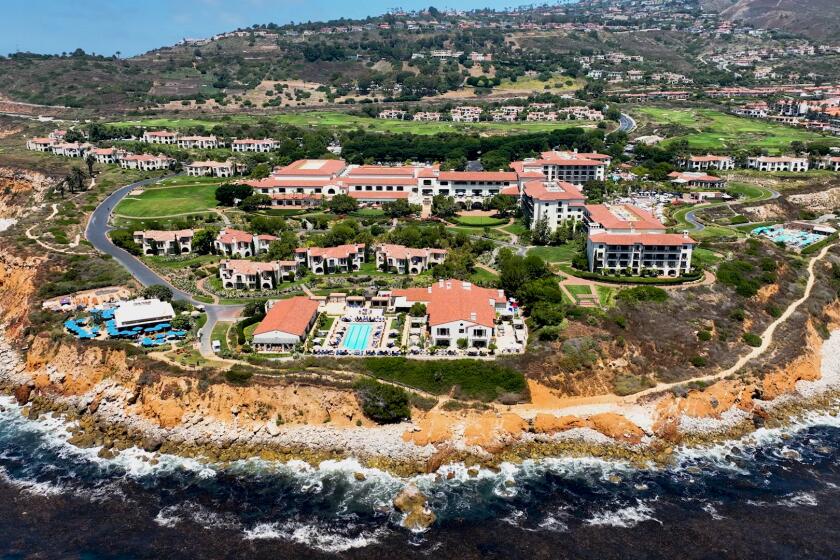Times investigation spurs complaints seeking federal probe of Kevin McCarthy PAC spending at luxury resort

- Share via
Federal election officials have been asked to investigate whether former House Speaker Kevin McCarthy personally benefited in violation of the law from the nearly quarter of a million dollars his campaign committees spent at a luxury Rancho Palos Verdes resort while he served in congressional leadership.
Complaints filed with the Federal Election Commission by two workers at the Terranea Resort cite the findings of a Times investigation published in December that showed that two McCarthy committees spent about $240,000 at the seaside hotel and spa during a 2½-year period ending in 2018. The committees reported to the FEC that the expenses were for lodging and catering, and a McCarthy campaign spokesman told The Times they were for “our annual event,” which he also described as a “PAC retreat.”
The five-page complaints, which mirror each other, note that McCarthy did not provide to the FEC or The Times a more detailed explanation of the Terranea outlays, including the number of such retreats.
“Thus, this only adds to the question about the actual use of these funds,” the complaints say, adding that the payments “may have been made, not for legitimate PAC or campaign activities, but to personally enrich” McCarthy. The complaints also name McCarthy’s committees and their treasurer, Jill Thomson.
The McCarthy spokesman, Drew Florio, did not respond to Times requests to interview the former congressman and Thomson or otherwise obtain a comment from them about the complaints. An FEC spokesperson said the agency does not comment on requests for investigations or whether a probe has been launched.
Since 2012, McCarthy’s leadership PAC spent over 10 times more on private jets, restaurants and lodging than other congressional leaders did.
The complaints were filed by Terranea employees Antonio Rodriguez and David Gomez Martinez through a law firm that represents Unite Here Local 11, a labor union that is locked in a battle to organize workers at the resort. Rodriguez and Gomez Martinez are supporters of the unionization campaign.
The two employees state in the complaints that they worked at the resort “in various roles in the banquet and catering departments during the period in which these payments were made and do not have any knowledge or recollection of an event or events hosted by or held on behalf of Congressman McCarthy or his committees at the resort.” The complaints were notarized and signed under penalty of perjury.
They point out that the owners of Terranea, including Robert J. Lowe, founder of the company that developed the resort, have been major financial contributors to McCarthy’s committees. The complaints allege that the donations show that the relationship between McCarthy and the hotel owners is “extremely cozy.”
“The FEC needs to investigate where all this political money is going,” Rodriguez said in an email to The Times. Gomez Martinez declined to comment.
Lowe did not respond to interview requests made through his corporate office.
The Times investigation found that most of the money McCarthy spent at Terranea came from a thinly regulated leadership PAC he controlled, the Majority Committee PAC. The newspaper also reported that, according to FEC records, the Bakersfield Republican’s leadership PAC shelled out more than $1 million on hotels, private air travel and eateries from 2012 through last June.
That’s more than double the combined total spent by the leadership PACs of the seven other lawmakers who’ve held the top House and Senate positions for their parties during all or part of that period, according to a Times analysis of FEC filings. A historic rebellion led by far-right Republicans ousted McCarthy as speaker in October, and he resigned from Congress in December.
Leadership PACs like McCarthy’s are subject to fewer spending controls than other campaign accounts. The legal guardrails on the PACs are so flimsy that the FEC determined last year that there is no bar on tapping committee money for personal expenses. As a result, lawmakers can use the PACs as slush funds to underwrite sumptuous lifestyles, good government advocates say.
But federal law does prohibit Congress members from spending funds from other campaign accounts on personal uses. About $116,000 of McCarthy’s expenses at Terranea came from one of his campaign committees. Most of that amount — $68,000 — was reported to the FEC as catering and lodging costs.
Altogether, the two McCarthy committees made 20 payments to Terranea from 2015 to 2018, while he served as House majority leader. Most were listed under the expense category of “lodging,” and 11 were in even-numbered amounts, such as $7,500 and $10,000. The reports did not explain why those amounts were in round dollars.
McCarthy’s spending at Terranea particularly stands out among the current and former congressional leaders because so much of the money has been reported as going toward lodging. And there’s no indication in McCarthy’s FEC filings why the Terranea expenses were heavy during the 2 ½-year period and then stopped, although one McCarthy campaign committee reported about $470 in meal expenses there in 2022.
The FEC does not require politicians to disclose on the finance reports many details of spending beyond the recipient, date, amount and general category of the expense. McCarthy’s records do not say who stayed or dined at Terranea courtesy of the committees, and there are no breakdowns for how much the PAC spent per night for a room, and nothing about what type of rooms, or how many, were rented. The records offer few clues as to whether the spending was in connection with specific fundraising events or any other campaign activities.
Florio, the McCarthy spokesman, said in a statement to The Times in October that the “expenses were for lodging, catering, event room rentals associated with the PAC retreat.”
He did not respond to follow-up questions, including those about the number of people who attended any events and the specific costs assigned to each one.
Violations of the law barring personal use of money from campaign accounts that are not leadership PACs have led to criminal convictions of former members of Congress, among them Duncan Hunter, a San Diego County Republican. Former Rep. George Santos (R-N.Y.) was expelled from Congress in December after House investigators determined that he spent tens of thousands of campaign dollars on rent, a sexually explicit website, Botox and luxury goods.
But the regulations for leadership PACs have been ill-defined since the FEC authorized the committees in the late 1970s. Critics contend that the prohibition on personal use of campaign money — outlined under the Federal Election Campaign Act — also applies to the leadership committees, but they have been unable to persuade a majority of the FEC to take that position.
In its decision last winter, the FEC ruled 4 to 2 that nothing in the law bars politicians from using leadership PAC money for personal expenses. The decision resulted from a complaint that a leadership PAC for former House member Lou Barletta (R-Pa.) had paid his wife $33,000 in rent for a property that he owns with her.
Advocates for tougher enforcement of campaign finance laws have long accused the FEC of looking the other way when presented with complaints of alleged violations. Among them is Saurav Ghosh, director of federal campaign finance reform for the Washington-based Campaign Legal Center, a nonprofit organization whose mission includes advocating for transparency in election spending.
“The FEC doesn’t enforce the law in most cases,” Ghosh said.
Through the agency’s press office, The Times asked the six commissioners who preside over the FEC to respond to that criticism and received no reply.
More to Read
Sign up for Essential California
The most important California stories and recommendations in your inbox every morning.
You may occasionally receive promotional content from the Los Angeles Times.
















